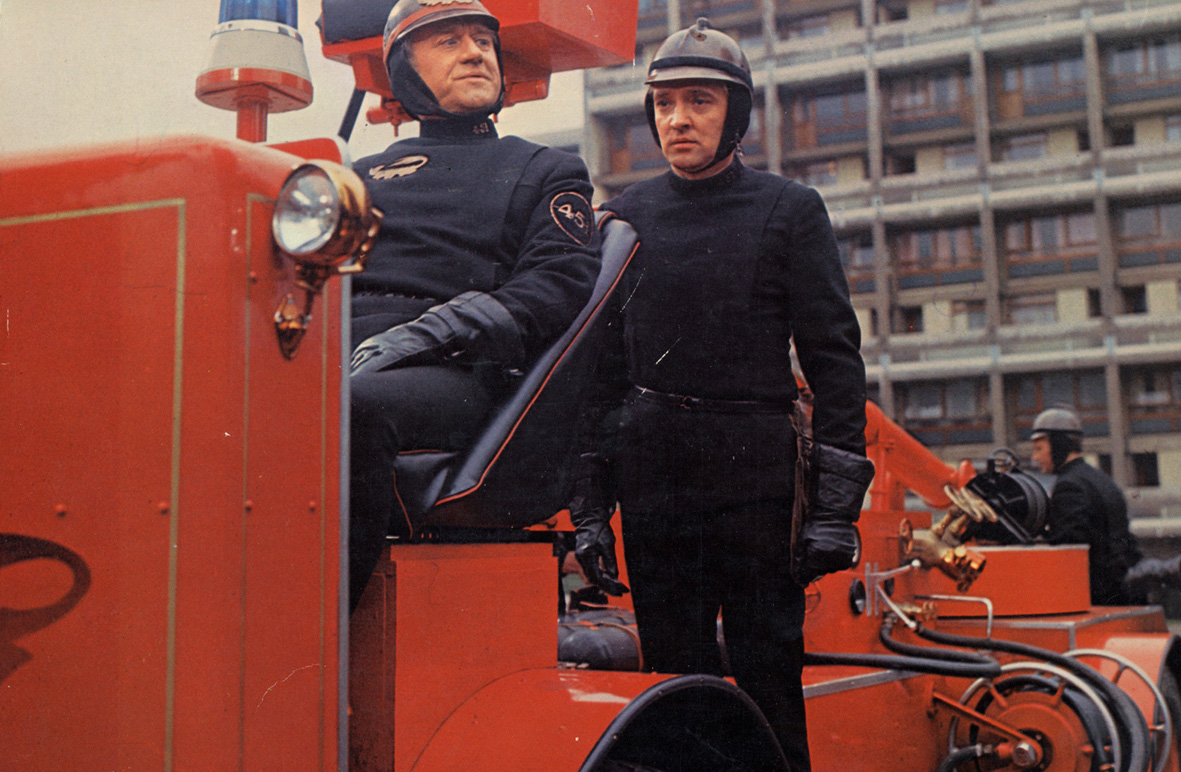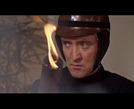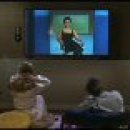Some years ago, on the heels of the success of Trauma, Life in the ER, we began shooting other ‘reality’ shows – Paramedics, Police Force, Breaking News and so on.
One we tried, without success, was Fire Fighters.
We spent a month with a firehouse in Boston, but by the end of the month, the most exciting thing that had happened was a few toaster fires and a dryer that had overheated.
Technology, and the mandatory installation of sprinkler systems had rendered most big fires almost non-existant. (There are still a few, but rarities). As a result, the firefighters didn’t do much, except sit around the firehouse and cook and eat. (Maybe we should have sold it to the Food Network instead).
Firemen though, still catch our imagination.
Perhaps you will recall Montag, the Oskar Werner role in Francois Truffaut’s rendition of the Ray Bradbury book Fahrenheit 451. In the novel, and film, (set in the UK), Montag is a fireman of the future. But his job is not to put out fires, it is to burn books.
The society of the future burns books because they carry memories – because they can irrationally move people. Books are seen as dangerous. A threat to ‘cultural stability’. Of course, Truffaut’s film, produced in 1966, was meant as a statement against the dangers of Communism, but today it speaks to us in a very different way.
As our own firemen have been rendered nearly obsolete because of the impact of new technologies, so too would Montag and Bradbury’s firemen have found themselves increasingly obsolete – their jobs of book burning almost superfluous, in our own culture.
Here are some astonishing stats:
1/3 of high school graduates never read another book for the rest of their lives.
42 percent of college graduates never read another book after college.
80 percent of U.S. families did not buy or read a book last year.
(Source: Jerold Jenkins, www.JenkinsGroupInc.com)
We don’t have to burn them… we just ignore them instead.
And it is not just books, of course. Newspapers suffer the heaviest toll as their average demographics begin to arc between 85 and dead. Young newspaper readers are as rare as rockinghorse dung. In Fahrenheit 451, the population now spends its time watching large video screens at home (Bradbury, how predicted satellites also did a pretty good job with plasma monitors).
The number one rated show? Family.
It’s all about you ( or rather ‘me’) as Julie Christie tells Oskar Werner when he comes home and finds her plugged into the never-ending Family show.
Our own self-absorbed ‘family’ (its all about you) is to be found on MySpace and Facebook.
Facebook, (of which I am also a member) was recently valued at a staggering $15 billion.
By way of comparison, The New York Times Company (not the paper, the whole company, which also owns The Boston Globe and lot of other stuff) is valued at $3.2 billion, and falling.
There is, of course, a lot to read on Facebook. But is there anything there worth reading?



3 Comments
NinoG December 04, 2007
Michael, like they say, if you are not part of the solution then you are part of the problem, and indeed you are part of the problem. Your very own methods of productions are anti-reading. Your claims that research is not necessary but just go out there with the camera and be spontaneous and creative will inevitably result in unintelligent productions, as we’ve seen in most of the video clips that you have shown.
Extensive research, thus reading, is fundamental for any intelligent result. Let me give you two examples 15 years apart with hundreds in between, this are jobs that will always stand out in my minds because they were very unusual. In 1992 I was commissioned by the government of an island in the Caribbean to produce a video about the history of the island. All I knew from what I remembered from school was that this Island country was part of the West Indies, I didn’t know exactly were, never mind about its history. The job paid well and was well worth my time. I spent almost a month reading about the island, back then there was no internet, only libraries and newspaper archives. What a job I have, I’m actually getting paid to read and learn. After 30 days I presented a synopsis of the project and they flipped, I had things written downs about their own history that they didn’t even know about it. The job took 3 weeks to shoot and I had a really big crew to work with, my 13 years old son and me.
Unquestionably the most exiting part of this business and doing “real intelligent†productions is the in depth learning about something new, every week is something else, something that most people would only dream of knowing. While reading and conducting the research the programs evolves in my mind and once the research is over is time to make that learning come alive with images. Seeing thru your camera the things that you’ve learned by reading is like visiting for the first time a place that you’ve heard of it all your life, it’s exciting. Only those who have done it would understand the satisfaction, those who never did it would not understand it and most likely find it unnecessary.
In my 38 year career there are many things that I had to learn in order to create intelligent productions and all involved extensive reading, hundreds of books. Among the assignments that stand out in my mind as exciting are the inner working of a nuclear submarine, the building of 747, behind the scene of an aircraft carrier and many more. Hundreds of successful productions that all started with, what else? Reading.
Last years I was hired to do a program on the start-up of a gold mine being developed in the Sonoma Desert in Mexico. I knew nothing about gold mining but 2 weeks after signing the contract I was an expert in the very involved and complicated process of surface mining. Again another very lucrative long term assignment made possible by intelligence research (reading). So far I’ve taken six trips to the mine in Mexico and probably I will take another six before the project is done.
Reading is not only reserved for major subjects, even when I do a simple interview I want to know everything about the person that will sit in front of my camera, more reading.
Reading IS the most important part of an intelligent production, without it you have unintelligent productions.
bensails December 02, 2007
Those are some depressing statistics.
I would ask, though, was there ever been a golden age of literacy? Has there ever existed a well informed, highly literate general populace?
Pingback: Best Books of the 20th Century: Fiction » Blog Archive » “Do You Ever Read The Books You Burn”?